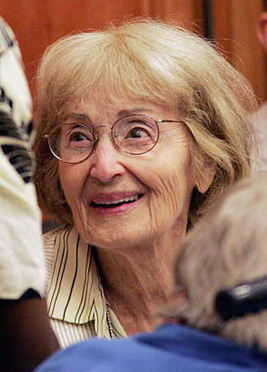Carolyn Goodman (psychologist)
American psychologist and civil rights activist
Carolyn Elizabeth Goodman (née Drucker; October 6, 1915 – August 17, 2007) was an American psychologist and civil rights activist. She is best known for her work in the civil rights movement and for being the mother of Andrew Goodman, one of the three civil rights workers murdered in Mississippi in 1964.
Early life and education[edit | edit source]
Carolyn Goodman was born in Woodmere, New York, to a Jewish family. She attended Cornell University, where she earned a bachelor's degree in home economics. She later pursued graduate studies in psychology, earning a master's degree from City College of New York and a doctorate from New York University.
Career[edit | edit source]
Goodman worked as a clinical psychologist in New York City, where she focused on child development and family therapy. Her professional work was deeply influenced by her commitment to social justice and equality.
Civil rights activism[edit | edit source]
Carolyn Goodman became actively involved in the civil rights movement in the early 1960s. Her activism was partly inspired by her son Andrew's commitment to the cause. Andrew Goodman was a participant in the Freedom Summer campaign, a voter registration drive aimed at increasing the number of registered Black voters in Mississippi.
In June 1964, Andrew Goodman, along with fellow activists James Chaney and Michael Schwerner, was murdered by members of the Ku Klux Klan in Neshoba County, Mississippi. The event, known as the Mississippi civil rights workers' murders, drew national attention to the civil rights movement and highlighted the dangers faced by activists in the South.
Following her son's death, Carolyn Goodman became a prominent advocate for civil rights. She co-founded the Andrew Goodman Foundation, which promotes social justice and civic engagement. She also participated in numerous speaking engagements and civil rights events, using her platform to advocate for racial equality and justice.
Legacy[edit | edit source]
Carolyn Goodman's legacy is marked by her unwavering commitment to civil rights and social justice. Her work has inspired generations of activists and continues to influence the fight for equality in the United States. The Andrew Goodman Foundation remains active in promoting civic engagement and social justice initiatives.
Personal life[edit | edit source]
Carolyn Goodman was married to Robert Goodman, and together they had three children: Andrew, Jonathan, and David. Her family life was deeply intertwined with her activism, and she often spoke about the impact of her son's death on her commitment to civil rights.
Death[edit | edit source]
Carolyn Goodman passed away on August 17, 2007, in Manhattan, New York City, at the age of 91. Her contributions to psychology and civil rights continue to be remembered and celebrated.
Related pages[edit | edit source]
Search WikiMD
Ad.Tired of being Overweight? Try W8MD's physician weight loss program.
Semaglutide (Ozempic / Wegovy and Tirzepatide (Mounjaro / Zepbound) available.
Advertise on WikiMD
|
WikiMD's Wellness Encyclopedia |
| Let Food Be Thy Medicine Medicine Thy Food - Hippocrates |
Translate this page: - East Asian
中文,
日本,
한국어,
South Asian
हिन्दी,
தமிழ்,
తెలుగు,
Urdu,
ಕನ್ನಡ,
Southeast Asian
Indonesian,
Vietnamese,
Thai,
မြန်မာဘာသာ,
বাংলা
European
español,
Deutsch,
français,
Greek,
português do Brasil,
polski,
română,
русский,
Nederlands,
norsk,
svenska,
suomi,
Italian
Middle Eastern & African
عربى,
Turkish,
Persian,
Hebrew,
Afrikaans,
isiZulu,
Kiswahili,
Other
Bulgarian,
Hungarian,
Czech,
Swedish,
മലയാളം,
मराठी,
ਪੰਜਾਬੀ,
ગુજરાતી,
Portuguese,
Ukrainian
Medical Disclaimer: WikiMD is not a substitute for professional medical advice. The information on WikiMD is provided as an information resource only, may be incorrect, outdated or misleading, and is not to be used or relied on for any diagnostic or treatment purposes. Please consult your health care provider before making any healthcare decisions or for guidance about a specific medical condition. WikiMD expressly disclaims responsibility, and shall have no liability, for any damages, loss, injury, or liability whatsoever suffered as a result of your reliance on the information contained in this site. By visiting this site you agree to the foregoing terms and conditions, which may from time to time be changed or supplemented by WikiMD. If you do not agree to the foregoing terms and conditions, you should not enter or use this site. See full disclaimer.
Credits:Most images are courtesy of Wikimedia commons, and templates, categories Wikipedia, licensed under CC BY SA or similar.
Contributors: Prab R. Tumpati, MD

